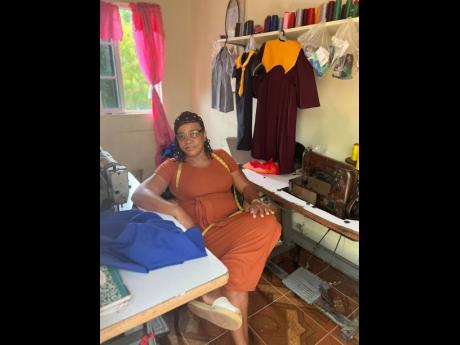Growth & Jobs | Dressmaker initiates ‘Plan B’ after setback by Beryl
IN THE wake of Hurricane Beryl, the lack of electricity in New Forest, Manchester, for several days severely disrupted Yvette Ming’s sewing business, Ming’s Uniform and Gears. This setback could not have come at a worse time, as the summer months are her busiest during which she works tirelessly to meet the huge demand for school uniforms.
“It set me back significantly. When you are determined to make it, you have to have a Plan B. I told my customers that I’m going to cut the fabric and go to the house I used to live in Kingston, which has light, to sew and bring back their things,” she said.
Ming sews uniforms for students attending more than 10 schools in Manchester and St Elizabeth and has a contract with 20 schools to sew jerseys.
To mitigate future power disruptions, Ming, who owns four electric sewing machines, is considering purchasing a manual sewing machine or a generator.
She related that in preparation for the back-to-school rush each year, she begins sewing uniforms in June. Despite the early start, the large volume of orders often requires her to start her days at 4 a.m., and she works up until 11 p.m.
“Everybody wants four uniforms. Sometimes you have to give them two uniforms to start and then they get the next two [at a later date]. That’s how I have to do it,” she explained.
“Sometimes I don’t know how the bed feels. I just spread something in the sewing room and lie on the ground. When I go in the bed, I get too comfortable. After back to school, I have to take at least a week to rest. I’m overworked just to help someone go back to school,” she said.
Despite the exhaustive schedule, finding additional help has been a challenge for her, as she pointed out that young people are generally uninterested in the trade. She has only one person to help tack buttons and press the clothes. After the back-to-school period, another dressmaker avails herself to help with sewing the jerseys.
“Nobody wants to do that type of work. I don’t know why. Right now, I need a machine operator to help me sew. I cannot get a machine operator. I would train them. I’m looking all over and can’t find anyone to teach the skill. I don’t know what else to do. When I pack up sewing, what is going to happen?” she lamented.
“This skill makes money. I don’t know why they don’t like it. During COVID, when everything was locked down, we made money off masks. It is the sewing that helped me build my house and sustain my family. Honestly, I can’t complain. Sometimes, I have to refuse work. I can’t manage, it’s too much.”
Ming’s journey into dressmaking started with much reluctance. Her mother, also a dressmaker, would often ask her to tack buttons and hem clothes when she was about 12 years old.
“I used to cry. I didn’t like it, and I didn’t want to do it.”
At 16, she relocated with her mother to Port Antonio, Portland, and later to Kingston, where she worked as a domestic helper. It was during this period that an invitation at her church, Bethel United Apostolic, changed the trajectory of her life. The church was offering dressmaking classes. Seizing the opportunity to gain independence and work for herself, Ming learned the basics of sewing.
Her new-found skill led her to a job at a boutique in New Kingston. On her first day, she questioned whether she had the ability to sew at such a high level. Her doubts were quickly dispelled when the proprietor, impressed with a skirt she sewed as a test of skill, reassured her of her talent. Ming honed her skills at the boutique, where she learned to make bridesmaid dresses. When the boutique closed, she transitioned to working in factories and with other dressmakers. By day, she sewed seat covers in a factory, and by night, she continued sewing clothes at home. The dual workload was taxing, prompting her to leave the factory and pursue her dream full-time – a decision she has never regretted.
Three years ago, a major turning point in her business came when her daughter introduced her to JN Bank Small Business Loans. Initially, they had planned to use a loan to operate a taxi service together.
“It was during COVID, when schools were locked down. We were thinking of another business alternative, but that didn’t work out as she was planning to migrate, so I used the loan to boost the business,” she disclosed.
Impressed by the ease of accessing a loan, Ming subsequently obtained other loans to service her sewing machines, purchase fabric, sewing implements and accessories in bulk in Kingston, reducing her need for frequent trips there.
Marsha Salmon-Ebanks, client relations manager, JN Bank Small Business Loans, commends Ming for her decision to improve her business.
“As an organisation, we are always delighted to see how many small businesses, like Ming’s Uniform and Gears, are able to thrive because they were able to access financial support,” she said.
“Loans often help small businesses to bridge financial gaps and manage cash flow, allowing them to maintain smooth operations and take advantage of opportunities to invest in their growth, stability, and long-term success. Witnessing the positive impact our loans have on these businesses, reaffirms our commitment to supporting small business owners,” Salmon-Ebanks pointed out.

